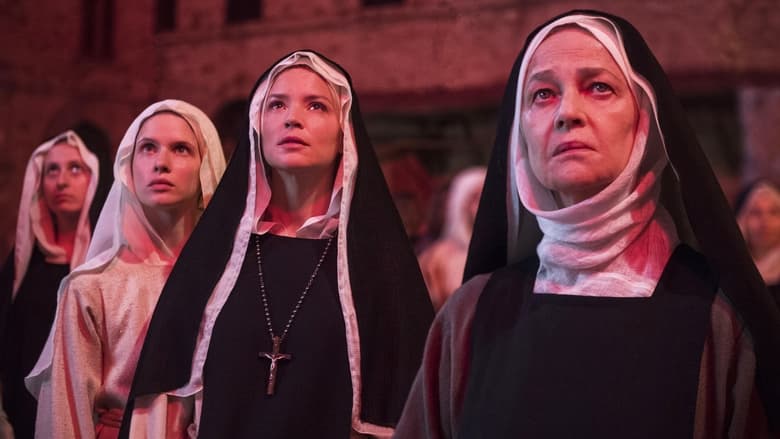
Benedetta is Paul Verhoeven’s extraordinary film about belief, embedded in scandalous Renaissance history.
Let’s get right to the scandalous part, which has earned Benedetta notoriety since its premiere at Cannes. As a filmmaker, Paul Verhoeven has proven himself to be an enthusiastic provocateur with the lurid Basic Instinct and Showgirls and the more mature (and still subversive) Elle.
So, everybody expects something outrageous from Verhoeven, but, in Benedetta, he plunged right past naughty to sacrilege – two nuns pleasuring each other with a figurine of the Virgin Mary adapted into a dildo. I had originally titled this review “two nuns, a dildo and the Black Death“.
But Benedetta is really a highly entertaining parable, albeit a cynical one, about belief and class. Here’s the story.
It’s the early 1600s in Tuscany, and Benedetta, the precocious and spirited eight-year-old daughter of a rich family (more on that later) enters a convent. Even as a child she attracts strange happenings, which could be miracles or coincidences. She grows into a talented young woman (Virginie Efira of Sibyl). With a gift for performance and her education, she becomes indispensable to the abbess (Charlotte Rampling), whether as the star of religious pageants or in keeping the convent’s books.
When the earthy and saucy Bartolomea (Daphné Patakia) joins the convent, the two become secret lovers.
Benedetta starts having more intense visions – visions of a very tangible Jesus. She starts speaking in a male register, as if possessed by Him. Then she develops stigmata. Holy moly!
Are these real miracles on earth produced by God – supernatural events that result from sincere faith? Or are they a hoax, dishonestly manufactured by Benedetta for her own benefit? Or is she experiencing delusions, hallucinations and disassociation due to what we understand today as a mental disorder?
The canny abbess (Rampling) and the provost (Olivier Rabourdin) the town’s chief religious leader, both from the educated upper class, disdain any possibility of miracles here, but cynically choose to accept the financial benefits of their very own destination for pilgrims. The parish priest, mindful of his superiors’ authority and the new money, turns a blind eye. It’s established early in Benedetta that the convent is run on money, not only on devotion, and that the hierarchy of the Church is entirely corrupt. Unfortunately for the locals, the papal nuncio to Florence (Lambert Wilson) gets wind of the possible chicanery, and he won’t be made a fool of.
Of course, people tend to believe what conforms to their own narratives. In Benedetta, belief in the supernatural is presented not as faith, but as superstition – and it runs along class lines. Benedetta, the abbess, the provost and the nuncio are privileged to have been born to wealth, which brings education and power. The townspeople and the nuns from humble backgrounds are ignorant and gullible – why wouldn’t God appear in my time and my town?
Bartolomea is most assuredly from among the ignorant and powerless, but, between orgasms, she sees what is happening with her own eyes.
Benedetta is based on Judith C. Brown’s book Immodest Acts: The Life of a Lesbian Nun in Renaissance Italy. Benedetta Carlini, Sister Bartolomea, Father Ricordati and the papal nuncio Alfonso Giglioli are real historical characters. Benedetta and Bartolomea’s sexual liaison, Benedetta’s claims of stigmata and supernatural visions and the Plague in northern Italy all really happened. Verhoeven took some liberties with the ending (and the dildo).
Verhoeven sure lets us know that we are in 17th Century Italy. A hundred years before, Michelangelo and Brunelleschi may have been changing the world’s culture 45 miles away in Florence, but this is still an age where the Church can have someone burned at the stake. This is a world of the bubonic plague, roving bands of mercenary brigands, self-flagellation by the devout and horrific (off-screen) torture.
One of the pleasures of Benedetta is the medieval and Renaissance music on the soundtrack.
There isn’t a bad performance in Benedetta. I gotta say that Charlotte Rampling remains one of my favorite screen actors, with her eyes ranging from the most piercing to the saddest and most knowing. Benedetta is far from her most transgressive film, having starred in The Night Porter (1974). Rampling has delivered some of her most powerful work in the past decade: 45 Years and The Sense of an Ending.
Ever the carnival barker, Paul Verhoeven draws an audience into the tent with over-the-top sex and sacrilege for a thoughtful exploration of faith and superstition. Benedetta is now in a few art house theaters.
